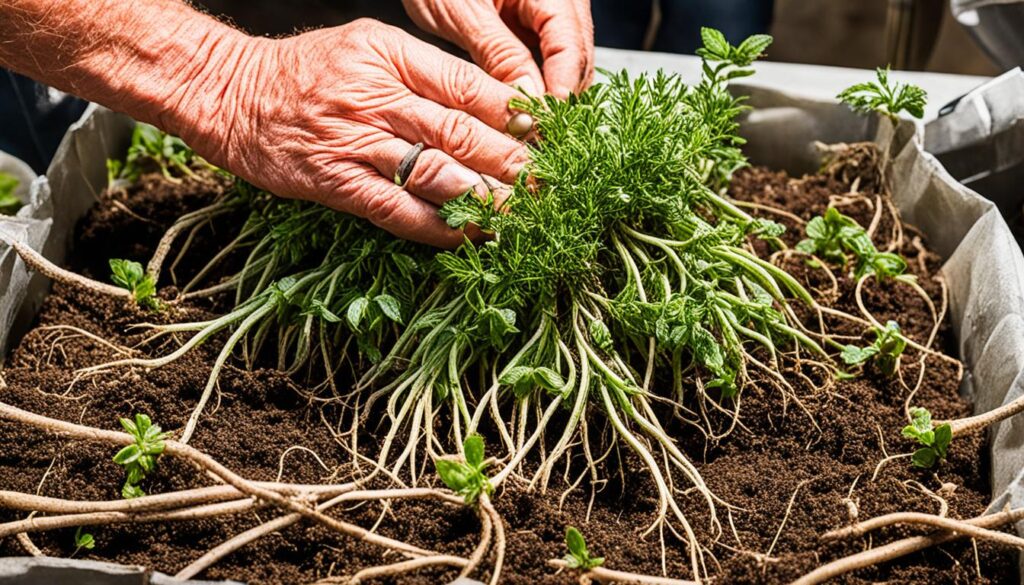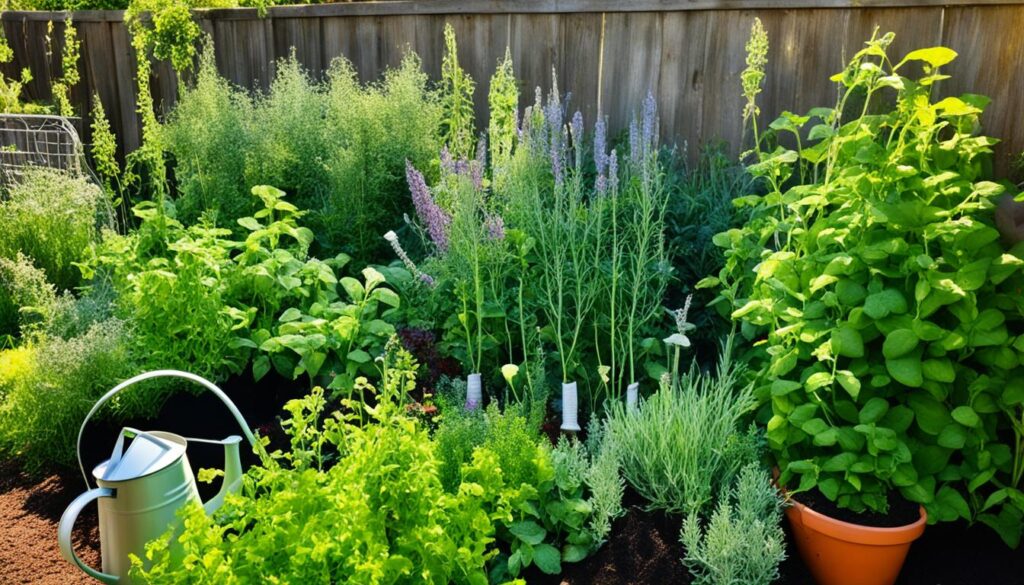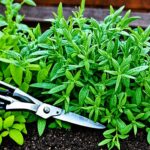How to Care for Your Herbs: Watering, Fertilizing, and Pruning Tips
Are you ready to grow a vibrant herb garden but don’t know where to start? This guide is for you! We’ll cover the key steps to care for your herbs, from watering and fertilizing to pruning and upkeep. These tips are great for both experienced gardeners and beginners. They’ll help you grow healthy, tasty herbs right in your own garden.
Herbs add a lot to your kitchen and garden, but they need a little care to stay healthy. By learning how to water garden herbs, fertilize herbs, and prune herbs, you’ll have a beautiful, easy-to-maintain herb garden. This will make your cooking better and your garden look great.
Key Takeaways
- Proper watering techniques are crucial for maintaining healthy, thriving herbs
- Fertilizing herbs at the right time and with the appropriate products can boost growth and production
- Pruning and pinching herbs encourages bushy, compact plants and extends the harvest season
- Understanding the specific needs of different herb care tips is key to maintaining herb garden success
- Mastering the basics of garden herb upkeep and herb garden care will lead to healthy herbs and the best best practices for herbs
Why Grow Fresh Herbs
Growing herbs at home brings many benefits to your cooking and daily life. It adds a special touch to your meals and keeps you stocked with fresh ingredients. The smell of herbs and the ease of having them on hand make it a great choice.
Benefits of Growing Herbs
One big plus of growing herbs is having fresh, flavorful ingredients right in your kitchen. Herbs like basil, chives, parsley, and thyme make many dishes taste better. Plus, you can be sure they’re free from harmful chemicals, making your food healthier.
Popular Herb Varieties
There are many popular herb varieties you can grow in your garden. Some top choices include:
- Basil
- Chives
- Parsley
- Dill
- Thyme
- Oregano
- Rosemary
- Mint
These herbs grow well in well-drained soil and full sun. Adding a mix of herbs to your garden means you always have fresh ingredients for cooking. This can make your cooking better and bring more joy to your meals.
Planting Herbs: Seeds vs. Transplants
When growing a herb garden, you can start with seeds or transplants. Herbs like basil, chives, parsley, and dill do well from seeds. You can either start seeds indoors early or plant them outside after the last frost.
Starting Herbs from Seeds
Starting herbs from seed is easy. Put the seeds in well-draining soil, following the packet’s instructions. When seedlings appear, give them lots of sunlight and water to help them grow strong.
Planting Herb Transplants
Some herbs, like rosemary, thyme, and sage, do better as transplants. These have a strong root system, giving them an advantage over seed starting. When moving seedlings, pick a sunny spot with good drainage and plant them at the same depth as before.
Whether you start with seeds or transplants, success comes from the right conditions. Make sure your herbs get full sun and the right care. With the right attention, you’ll enjoy a season full of fresh, tasty herbs.
Watering Your Herb Garden
Proper watering is key for a healthy herb garden. Most herbs like soil that drains well and taste best when a bit dry. The watering requirements for herbs vary by soil type, weather, and herb type.
Assessing Watering Needs
Start by watering enough to moisten the soil 6 inches deep. This keeps your herbs moist but not soggy. Check the soil often and water when it feels dry up to 2 inches deep.
Efficient Watering Methods
For watering your herb garden, consider soaker hoses or drip systems. These deliver water right to the roots, avoiding fungal diseases. Avoid overhead sprinklers, as they can cause fungal issues.
Watering in the morning or evening is a good tip. This reduces evaporation, letting your herbs soak up the water. Knowing your herb garden irrigation needs helps your herbs grow well and gives you a great harvest.
| Herb | Watering Frequency | Soil Moisture |
|---|---|---|
| Basil | 1-2 times per week | Consistently moist |
| Rosemary | Once a week | Slightly dry between waterings |
| Thyme | Every 7-10 days | Dry to the touch before watering |
“The secret to a thriving herb garden is finding the right balance between keeping the soil moist and allowing it to dry out slightly between waterings.”
Fertilizing Herbs
Herbs are easy to care for but need some help with fertilizing. Fertilizing your herb garden right is key for strong growth and great taste. But, be careful not to over-fertilize herbs as it can make them taste bad.
Avoiding Overfertilization
Herbs don’t need as much fertilizer as some plants. In fact, over-fertilizing herbs can hurt their growth and taste. They only need a little bit of nutrients to stay healthy and tasty.
- Use organic fertilizers that break down slowly or controlled-release manufactured fertilizers for the best results.
- Follow soil test recommendations or product label directions to figure out how much fertilizer to use for your herb fertilizer needs.
- Avoid using fresh manure, as it can spread harmful bacteria to your herbs.
Knowing how to fertilize herbs right and avoiding over-fertilizing herbs will help you grow a healthy and tasty herb garden. Remember, herbs do best with a balanced approach to fertilizing herb garden care.
Pruning and Pinching Herbs
Regular pruning and pinching your herbs is key to their care. The new growth is the tastiest part of herbs. Pinching off 2-3 inches of stem tips makes them branch out and stay bushy. This keeps your herb plants the right size and shape.
Encouraging New Growth
Pinching herbs often makes them fuller and healthier. It works great for herbs like basil, mint, and thyme. Cutting off the top buds makes them grow more leaves and branch out.
Pruning Woody Herbs
Herbs like rosemary, sage, and lavender need more pruning. Cut them back by one-third in early spring before they start growing again. This encourages new, strong growth and keeps them looking good.
Using pinching and pruning together keeps your herb garden looking great. It makes ‘how to prune herbs’ easy and keeps your plants healthy. This way, you can ‘maintain herb shape’ and ‘rejuvenate woody herbs’ with the best ‘herb pruning techniques’.
Dividing and Propagating Herbs
Keeping your herb garden healthy and full of life is more than just planting and watering. You need to know how to divide clumping plants and grow new ones from cuttings. Learning the basics of ‘dividing herb plants’ and ‘propagating herbs from cuttings’ helps you keep your favorite ‘herb plant’ varieties coming back. It also lets you ‘multiply herb plants’ easily.
Dividing Clumping Herbs
Many herbs like chives and thyme grow into dense clumps or spread out over time. Dividing these ‘herb plant division’ helps them stay healthy and lets you make new plants. Just dig up the whole clump, split it into smaller pieces, and replant them in your garden.
Propagating from Cuttings
‘Herb propagation techniques’ like taking cuttings are great for growing more herbs. You can use this method for woody herbs like rosemary and for less woody ones like mint and basil. By following the right steps, you can make new plants that are just like the originals. This way, you always have your favorite ‘herb plant varieties’ on hand.
| Herb | Propagation Method |
|---|---|
| Rosemary | Stem cuttings |
| Mint | Cuttings, division |
| Basil | Cuttings |
| Chives | Division |
| Thyme | Division |

“Dividing and propagating herbs is a great way to keep your garden thriving and ensure a constant supply of your favorite flavors.”
Mulching Herb Gardens
Keeping a herb garden healthy needs a good plan, and using mulch is key. Putting organic mulch around your herbs helps keep weeds down and keeps soil moist.
Benefits of Mulching
Choosing the right mulch for herbs is important. Wood chips, cocoa bean shells, and pine needles work well. Make sure to put the mulch 2-4 inches deep, but keep it away from the plants.
Mulching your herb garden has many benefits. It stops weeds from growing and keeps the soil moist, so you water less often. As the mulch breaks down, it adds nutrients to the soil, feeding your herbs.
Adding mulching to your herb garden care is easy but powerful. By picking the best mulch for herbs and knowing its benefits, you can have a garden that grows well with little work. This way, you get a lot of herbs every year.
Caring for Garden Herbs
Keeping a herb garden alive and full of life takes more than just planting and watering. To keep your herbs healthy and full of flavor, add general herb garden care to your routine. This includes regular weeding, watching for pests and diseases, and more. These essential herb care tasks will make your vibrant herb garden last all season.
Dealing with weeds is a big part of overall herb garden upkeep. Weeds can take over and steal what your herbs need to grow big and taste good. Check your herb beds every week and pull out any weeds you find. This keeps your herbs healthy and lets them grow well.
Also, watch for pests or diseases on your herbs. Look at the leaves, stems, and roots for any signs of trouble. If you see something wrong, fix it fast to keep your whole garden healthy.
Harvesting your herbs often is important too. Cutting off leaves and stems gives you fresh herbs for cooking and helps your plants grow more. Don’t let your herbs flower, as that makes them less tasty and less aromatic.
By following these tips for vibrant herb garden care, you’ll get a lot of healthy, tasty herbs all season. With the right overall herb garden upkeep plan, your garden will give you lots of fresh, flavorful herbs.

| Essential Herb Care Tasks | Benefits |
|---|---|
| Regularly Weed | Prevents competition for nutrients and water, allowing herbs to thrive |
| Monitor for Pests and Diseases | Identifies and addresses issues quickly to maintain plant health |
| Frequent Harvesting | Encourages continued growth and production of flavorful herbs |
Weeding Herb Gardens
Keeping your herb garden weed-free is key for its health and productivity. Weeding herbs regularly makes sure they get the nutrients, water, and sunlight they need. If you ignore this, your herbs might grow poorly, attract pests, or get diseases.
Importance of Weed Control
Weeds compete hard with your herbs for resources. If you don’t stop them, they can take over your garden. This means your plants won’t get what they need. Weeding herb gardens is vital for controlling weeds in herb beds and preventing weeds in herb gardens. By managing weeds in herb plantings, you help your herbs grow well.
- Weeds compete for nutrients, water, and sunlight, stunting herb growth
- Uncontrolled weeds can attract pests and diseases that harm herb plants
- Regular weeding maintains the health and productivity of your herb garden
“Keeping your herb garden weed-free is an essential part of its care and upkeep. Regular weeding ensures your herbs receive the resources they need to thrive.”
Make weeding herb gardens a regular habit. This way, you can control weeds in herb beds, prevent weeds in herb gardens, and manage weeds in herb plantings. Taking this step will help your herbs grow well and give you a great harvest every year.
Harvesting and Preserving Herbs
As the growing season ends, it’s key to harvest and preserve your herb bounty right. The best part of herbs is the tender new growth. So, focus on taking stem tips and leaves often. When frost is coming, don’t cut perennial herbs too low, leave a few inches to die back naturally.
Harvesting Techniques
To harvest fresh herbs, here’s what to do:
- Clip stem tips and leaves in the morning after the dew dries, when essential oils are at their peak.
- Use sharp, clean scissors or pruners for clean cuts and to avoid harming the plant.
- Harvest often to keep the plant healthy and productive.
Drying and Freezing Herbs
To extend the life of your herbs, dry or freeze them. Using preservation techniques lets you enjoy your herbs all year.
Here are tips for drying and freezing herbs:
- Dry herbs by hanging them upside down in a cool, dark spot with good air flow.
- Freeze herbs by washing, drying, and putting them in airtight bags or containers.
- Freeze herbs in ice cube trays with water or stock for easy use in cooking.
“Proper harvesting and preservation techniques will allow you to enjoy the flavors of your homegrown herbs all year round.”
Conclusion
By following the essential tips in this guide, you can grow a thriving herb garden. Make sure your herbs get the right amount of water, fertilizer, and regular pruning. This will help them grow strong and taste great.
Keep your herbs healthy by controlling weeds, dividing, and propagating them. This way, you’ll have a steady supply of fresh herbs all season long.
With the right care, you can enjoy fresh, homegrown herbs in your cooking. This guide has given you the key takeaways for herb gardening and recap of herb maintenance tips. These will help your herbs grow and flourish.
Starting your summary of herb care and conclusion on caring for herbs is exciting. Enjoy the process of tending to your garden. Let the final thoughts on growing healthy herbs inspire you to keep exploring the joys of homegrown herbs.
FAQ
What are the essential tips for watering garden herbs?
How should I fertilize my herbs?
When and how should I prune my herbs?
How do I divide and propagate my herb plants?
Why is mulching important for an herb garden?
How do I keep my herb garden weed-free?
When and how should I harvest and preserve my herbs?
Source Links
- https://www.bhg.com/gardening/vegetable/herbs/herb-care-guide/ – Herb Care Guide
- https://www.swansonsnursery.com/herb-care-sheet – herb care sheet — Seattle’s Favorite Garden Store Since 1924 – Swansons Nursery
- https://www.gardeningknowhow.com/edible/herbs/hgen/general-care-for-your-herb-garden.htm – Herb Garden Guide: Everything You Need To Know About Growing Herbs
- 10 Must-Have Blooms for Your 2025 Garden
- The Health Advantages of Gardening You Need to Know
- How to Create a Small Vegetable Garden Layout Plan: A Beginner’s Guide
- DIY Garden Projects for Small Spaces: Upcycling Ideas to Maximize Your Garden
- Watering Techniques for Small Gardens: Ensuring Your Plants Thrive
- Small Border Plants for Landscaping: Adding Beauty and Functionality to Your Garden
- Year-Round Small Space Gardening: Seasonal Planting Tips for Maximum Harvest
- Essential Tools for Small-Space Gardening: What You Really Need
- The Ultimate Guide to Container Vegetables: What to Grow in Small Spaces
- Budget-Friendly Gardening: How to Create a Thriving Garden on a Tight Budget
- How to Optimize Sunlight in Small Gardens: Tips for Better Plant Growth
- DIY Vertical Planters: Creative Ideas for Small Space Gardening
- Companion Planting for Small Vegetable Gardens: Boost Growth and Deter Pests
- Container Gardening Essentials: Choosing the Right Pots, Soil, and Plants
- Vertical Gardening Techniques: Maximizing Your Small Space with Climbers and Vines
- How to Build a Raised Bed Garden in a Small Backyard: Step-by-Step Guide
- The Best Vegetables for Small-Space Gardens: High-Yield Varieties You Need to Grow
- Smart Vegetable Garden Layouts for Small Spaces: Maximizing Your Green Thumb in Compact Areas
- 40. Best Practices for Managing a Sustainable Garden Year-Round
- Building a Wildlife Pond for Biodiversity
- Advanced Techniques in Sustainable Gardening
- How to Create a No-Till Garden
- The Mental Health Benefits of Gardening
- Using Technology to Enhance Sustainable Gardening
- Getting Certified Organic: Steps and Benefits

Leave a Reply